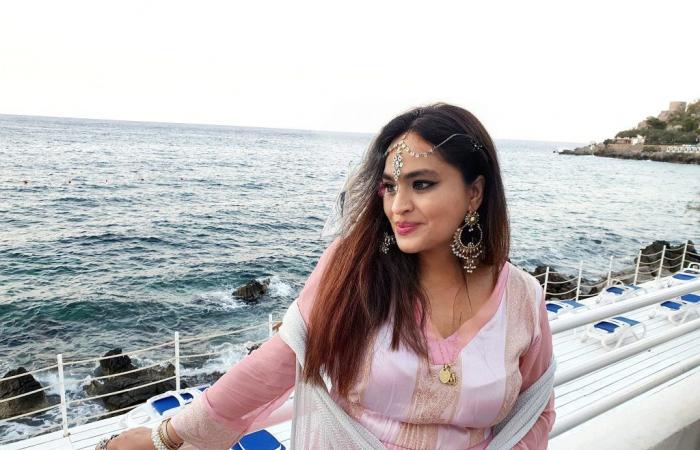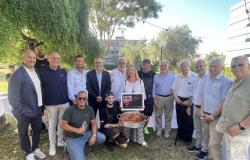Research on women’s emancipation and liberation in a comparative European context is part of her DNA. You can read it in the depths of her gaze, without fear of denial, absolutely hypnotic, she communicates to you with every part of her body the pride of being and feeling like a free woman, emancipated from every scheme, prejudice, mental construction. It is inevitable, therefore, to feel enraptured by her world, which reaches the study, the research, after a path in which people, humanity, women come first. Meeting her is always a journey into distant worlds, unknown in many respects, in which to get lost without the possibility of mediating with oneself.
He comes from Pakistan, Tehseen Nisar Hussain, a young Pakistani researcher who has chosen Sicily as a base to live and work, the ideal place to be inspired and regenerated at any moment of her life, including immediately after a trip. Which has been happening for a few months, having moved to Rome for work reasons.
She has been working in Italy for 14 years to understand how women interact with society, but also and above all with each other.
Why did you choose this country as your second home?
I came to study officially 14 years ago, even though I had already been studying and researching here for about 25 years, even if not continuously. I started my career as a teacher in a European Center in Pakistan, in Karachi to be exact, and then continued my research as a Muslim woman in an Italian context. However, I deepened my studies in various European countries, developing projects and working with LUISS in Rome, where I graduated and got my doctorate.
But what has always been your passion?
That of making Western societies known and how to help women find themselves within different social realities. For now, for example, I am developing my research at a not only Italian level, given that I am collaborating with the Indian University in Pakistan, setting myself the challenge of connecting all women in an international context. In fact, in 2021 I created a WhatsApp group, which is called Women&multiplemodernitieswhose aim is to grow a society that has in common solidarity and awareness of the profound spirituality of the human being.
Spirituality of which women are aware?
I imagined a very complicated situation for women like me, who are trying to find the right place in a culture different from their own. I think we need to ask ourselves how to interpret our life in a rather hybridized way, with a comparative attitude towards other women. I speak of heterogeneity of identity. We need to be able to confront this hybridity, the complexity of our origins which, together with the circumstances and political and cultural challenges at a sociological and economic level, are inevitably interconnected. I speak for and of women by virtue of my specialization in gender issues and the debate on subjugated women, as well as on emancipated cultures.
Issues that concern all cultures?
It is a totally different story in the North African context and in the European one. In areas like India or Pakistan, to give examples closer to me, we have very different realities, societies have a very strong multicultural level, which in the West we are not aware of. Unfortunately, the West does not know how to interpret these differences and this is the reason why there is a constant risk of generalizing and making a synthesis at a cultural and socio-economic level, centralizing the issue of women based on where they come from. My research addresses this issue, sensing the risk of making this generalization especially among women in the Middle East, for example in the Muslim community.
Women, whose identity is very different from that of those who come from Pakistan. It is generalized because, on the one hand, it is thought that all Muslim women are the same as the others, while on the other hand the debate is about what generates patriarchy. This is because we have remained under the influence of colonialism, but even the patriarchy under colonialism had a very different configuration from country to country. Women who have lived under the French patriarchy, for example, have a baggage of very strong differences from others. This is why we must separate the cases that pose a very new aspect of the debate on gender. However, if we do not think about it carefully, as I said before, we risk trivializing at every level,
But what is the most common mistake made in this debate? Who generalises?
Under colonialism, except for males and indigenous people, paradoxically it was women who generalized towards other women. There are paradigms with different levels of interpretation that we need to discuss. I say that, only when we really focus on this theme, will we be able to identify our ability to interpret, clearly, in a non-separate way.
What she is doing today was why she left home?
I would say yes. I am an academic and work in the field of gender studies, gender studies, soliciting and intervening in the debate on gender capacity and sustainability. We are living in a very complicated world compared to the structure of male subjugated societies, so the risk is to have our truth interpreted by the new digitalized era and globalization.
We must be very careful because, for example, during Covid, women suffered in silence. There were numerous incidents about which very little was known. At the moment I am collaborating with the university to develop different models of narration that come from the South and need to grow on a more general level. In the sense that there is a new approach to the debate on gender; hybridized people in a geo-politically complex context, between wars and conflicts that we experience right inside our homes. A situation that asks us for clarity on what is happening and on how and what can be built, how we can develop and grow together through solidarity. I say this because, without this spirit, the risk is of losing everything we have already built within the process of true emancipation.
I have said it and I repeat it, true liberation is that of the spirit. The physical level does not exist along this path. The slogan “My Body My Rights” is right, okay, it is a very important slogan, but we must understand what challenges lie within us, where the world built by ourselves is located.
Today, when he returns to Pakistan, what does he bring with him?
For now, I come back every three years both because I work and because flight costs have increased significantly. When I reunite with my family I bring them a very deep feeling as a gift, first of all because I was born in Pakistan and I am connected spiritually and mentally with my land. Next time, for example, I will return with an extra feeling, the one that fills me with joy these days because I have obtained Italian citizenship and I would say also and above all Sicilian. I feel within me a very strong bond with Sicily where my friendships and all my most important bonds grew. It’s incredible, there are no words to explain what I feel.
I can only say that when I set foot on this splendid land, I cried and every time I return from my travels I experience continuous emotions that make me feel like I belong to an island with a very deep history and humanity.. I don’t think there could be anything bigger. At least for me.






